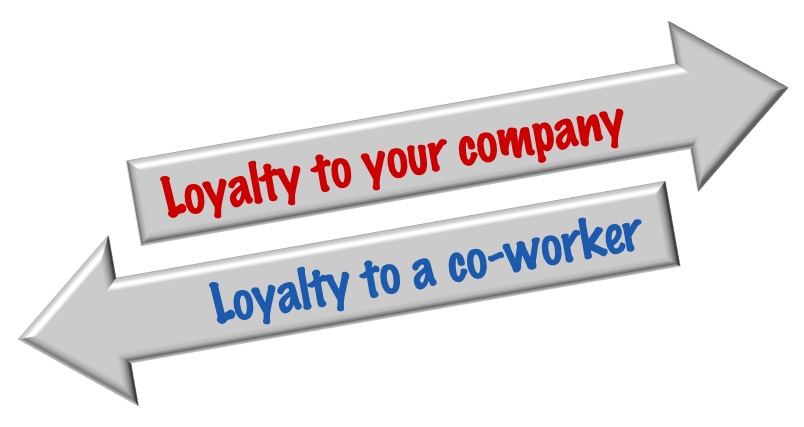Categories: Management
By Mark Tomalonis
Principal, WarehouseTWO, LLC
 Suppose that your employees are faced with a situation wherein they have to choose whom to protect, from between these two choices:
Suppose that your employees are faced with a situation wherein they have to choose whom to protect, from between these two choices:
How would your employees prioritize these choices? And why does this matter?
Consider these two scenarios:
Under either scenario, what action would your other employees take? Would they treat each scenario similarly? Would they act to protect the co-worker or your company?
Your company gives you a paycheck. A co-worker does not. ‘nuff said.
If your employees are aware of a co-worker who is acting illegally or unethically, or who is putting himself/herself or others in harm’s way, and those employees have not brought this behavior to management’s attention, then your company has a greater culture problem than I can address here. (Think “financial ruin” and “law suit”. Go from there.)
A more likely situation is that your employees are protecting an under-performing co-worker. In my experience, the most common reason for this is what I refer to as the “I don’t want to get a co-worker in trouble” syndrome.
Protecting an under-performing co-worker is detrimental to your company as a whole for many reasons, including:
Who does not want a staff of quality, motivated employees? The benefits are many, including:
There are many ways to deal with an under-performing co-worker. Training, closer management and re-assignment are just a few. (Oh, yeah. There is termination too.) The first step is being aware of the co-worker’s under-performance. The most likely source of this awareness is from your employees who place your company’s best interests above those of the under-performing co-worker.
About the Author After a successful career in sales and operations management in the wholesale-distribution industry, Mark Tomalonis is now principal of WarehouseTWO, LLC. He amuses himself by writing articles such as this one, to help wholesaler-distributors execute their operations better. Mark’s articles and tips are published in WarehouseTWO’s monthly e-newsletters. Click here to subscribe.
After a successful career in sales and operations management in the wholesale-distribution industry, Mark Tomalonis is now principal of WarehouseTWO, LLC. He amuses himself by writing articles such as this one, to help wholesaler-distributors execute their operations better. Mark’s articles and tips are published in WarehouseTWO’s monthly e-newsletters. Click here to subscribe.
About WarehouseTWO
WarehouseTWO, LLC is an independent “inventory-sharing” software tool created exclusively for durable goods manufacturers and their authorized distributors, and for any group of durable goods “peer” wholesaler-distributors, such as members of a buying/marketing group or cooperative. To learn how inventory-sharing with WarehouseTWO can help your business, visit the WarehouseTWO website, or email info@warehousetwo.com.